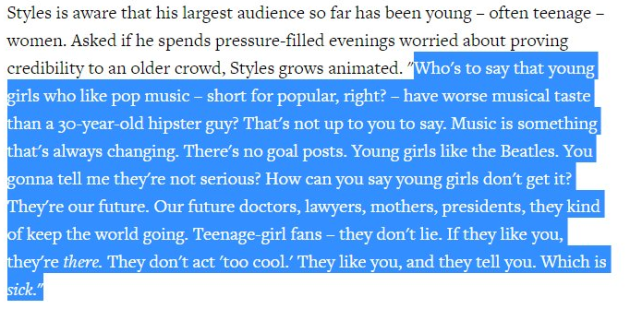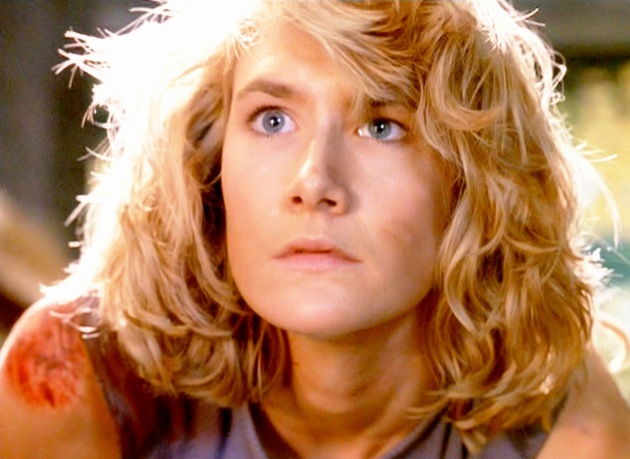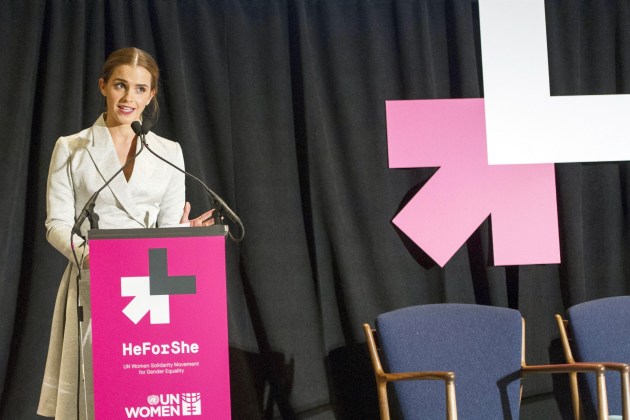So as we all sluggishly dragged ourselves to work after a no-doubt indulgent long bank-holiday weekend, we were treated to a rude awakening call; a general election.
However, rather than wallow in this impending doom I call Great Britain’s future I kept scrolling through Twitter for the meme’s and the will to live.
When I came across this little snippet of an interview by everyone’s fave babe, Harry Styles.

Now, I am well versed in white boys getting more credit than they’re due just for saying basic things like ‘women deserve human rights’ and shit. But I was actually genuinely a little impressed by Harry’s comments.
It is true that teen heart-throb boyband types grow up and suddenly want to be perceived as a srs tortured soul who has more srs things to be interested in than screaming girl fans.
However, Harry brings up an increasingly interesting comparison that I’ve seen used before. The Beatles were (are?) considered the greatest and most successful band of all time. They are considered the epitome of musical talent. Yet who were their core fanbase? You guessed it; teenage girls.

You’ll get many a male hipster these days though shouting at teenage girls wearing Beatles t-shirts that they’ve no right to be wearing it and to name Ringo Starr’s neighbours cat in order to prove herself worthy.
Is it probable that Harry Styles’ manager or agent may wish to tap into a new fan demographic? Is it really understandable that their marketing/PR team want to appeal to a new audience?
There is so much money in teenage girls. They have so much disposable income. Why would anyone want to move away and leave that? Unless they thought that teenage girls and their opinions weren’t credible. Unless they considered teenage girls and their opinions dismissive.
Which largely as a society, sadly, we do.
Beatlemania allowed women of that time to break free from society’s expected gender norms. However ‘mania’ and teen fanatics has now, after 50 years, become the norm that society expects from teenage girls and now ridicules it.
We need to demand respect of teenage girls and their interests. Demand respect from our parents, brothers, grandparents and most of all journalists and the media. Continually speaking of teenage girls interests as if they are ‘stupid’ or ‘silly’ and ultimately aren’t credible is terribly dismissive of teenage girls themselves. And this should not be acceptable.

 Yep, I did manage to root that out and find it for the purpose of this article. You’re welcome. (Please ignore the chewed edges, I think that was how my 4 year old self dealt with
Yep, I did manage to root that out and find it for the purpose of this article. You’re welcome. (Please ignore the chewed edges, I think that was how my 4 year old self dealt with  I went to see the 20th anniversary re-release of the film in 3D and the feelings of wonder and awe that I felt all those years ago were still present- the theatre was sold-out which helped intensify the feelings of an event. Spielberg used 3D as brilliantly as he used simple CGI 20 years ago- at essential moments to enhance the spectacle. With Jurassic Park feeling so timeless 20 years later, can we say the same for a modern day success such as The Avengers. Will that still be relevant and timeless in 2033? I doubt kids would have been chewing their DVD case with tension thats for sure.
I went to see the 20th anniversary re-release of the film in 3D and the feelings of wonder and awe that I felt all those years ago were still present- the theatre was sold-out which helped intensify the feelings of an event. Spielberg used 3D as brilliantly as he used simple CGI 20 years ago- at essential moments to enhance the spectacle. With Jurassic Park feeling so timeless 20 years later, can we say the same for a modern day success such as The Avengers. Will that still be relevant and timeless in 2033? I doubt kids would have been chewing their DVD case with tension thats for sure.  Can we please stop pitting actresses, women, against each other!?
Can we please stop pitting actresses, women, against each other!?







